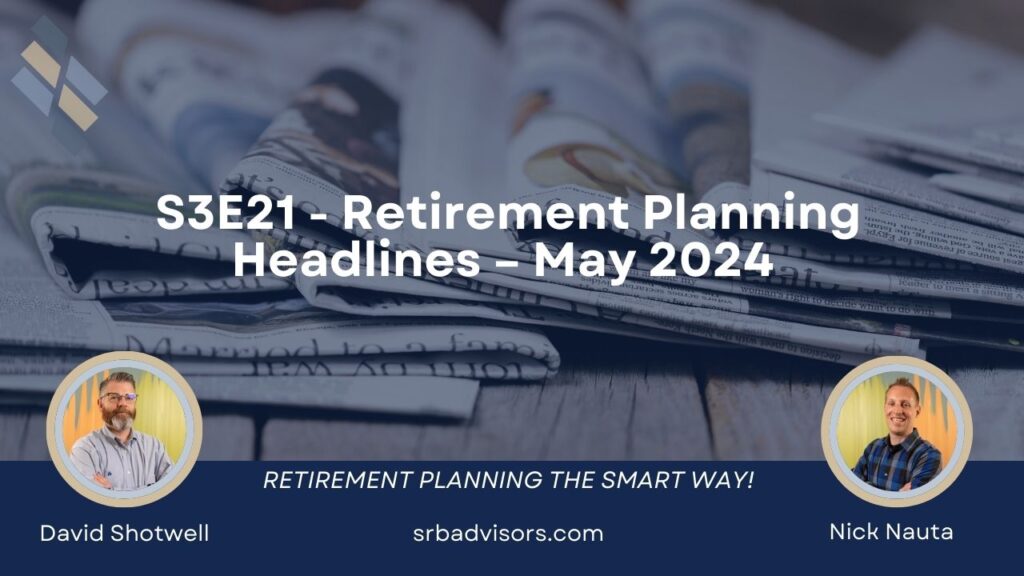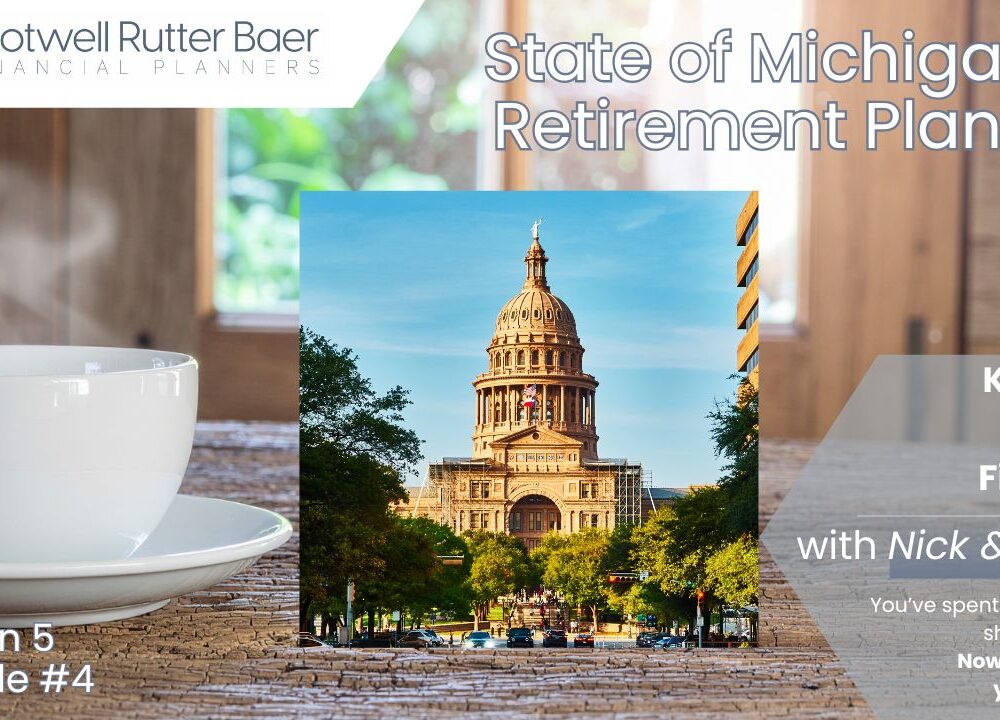S3E21 – Retirement Planning Headlines – May 2024

Podcast: Play in new window | Download
Welcome back to our much-anticipated May 2024 edition of “Retirement Planning Headlines,” where we save you the hassle of combing through endless financial articles. This month, we’ve even had listeners chime in with topics for our deep-dive discussions.
Watch on YouTube HERE
Articles Discussed in this Episode
How Much Should You Spend on Vacation?
- 5-10% of take-home pay on Vacations
- Never go into debt to pay for vacation
- Beware of luxury creep and entitlement creep
- Don’t get caught up in Instagram vacations
- Don’t be a vacation scrooge
Is planning for age 95 longevity overkill?
- How long should you plan to live in retirement?
- The industry practice of planning to 95 but a new report shows most people won’t reach this age
- The report notes that “for the almost 30 percent of the 65-plus population with diabetes, there is less than a one percent chance they will reach 95
- a typical 65-year-old man with no chronic conditions, there is only a 19.3 percent chance of living to 95. A 65-year-old with high blood pressure has slimmer odds, with a 17.5 percent chance of living for another 30 years.
- Plan to 95 and live to 86 could potentially spend an additional $447,000
- How to think about planning to 95
- Family health history
- Your health condition
- Making adjustments along the way
- Risk profile
- Legacy goals
Retiring Early Is Your Dream. 7 Steps to Make It Come True.
Steps to Weigh Early Retirement Decisions
- Understand the why
- Play devils advocate
- Crunch the numbers
- Plan ahead
- Social security considerations
- Factor in healthcare costs
- Consider part-time work
‘What Was I Thinking?’ The Big-Ticket Items People Regret
- Rolex
- Vacation home on land not owned
- RVs
- Clothing salesman with a $1,800 cover-up
The Downside of Delayed Gratification
- Research shows that if we decide not to use something (delayed gratification) the possession will feel more special
- Can lead to us not using at all or delaying too long instead of embracing the moment.
- The big takeaway is that delayed gratification isn’t always the answer
- The kids with the marshmallows! (shout out to Daniel Kahneman!)
- All the kids that were able to delay gratification DID SOMETHING to distract themselves
How Much Happiness Can Your Salary Buy? Researchers Can’t Agree
- Money buys happiness. With diminishing returns. And no magic number
- Money buys happiness
- Money matters for happiness, but not enormously
- It isn’t what money buys, but the choices it affords
- Diminishing returns
- As income increases, each dollar makes less of a difference in happiness
- More about % change than $ amount
- Magic number
- There is no magic number ($75,000 or $110,000 in today’s dollars)
- Money buys happiness
- Not a refutation of the underlying premise, but it does bring up nuances to the argument ($75k is an oversimplification)
Ugh. Do I Really Need a New Roof Right Now?
- Interesting for the topic, but also the philosophy
- Roofs can last longer than conventional wisdom, but the range is huge and depends on the environment, how it was installed, etc.
- The columnist had a roof leak
- Paid a roof inspector -and was told $2500 for a repair
- Also got an opinion from a roofing contractor – $18,000
- Paying for the inspection was well worth it
$2 Million Is Nothing’ Suze Orman Warns Don’t Retire If You Don’t Have At Least $5 Million Or $10 Million Saved
- What she got wrong
- Dollar amounts apply differently to different people
- What she got right
- Longer retirements mean more things will change so proceed with caution
HOW MUCH IS A MEMORY WORTH?
- How do we value our memories? Can we value them?
- With the benefit of hindsight, how much would I pay for that same trip knowing how much I value the memories?
- Memories of experiences tend to increase in value over time – even if the experience doesn’t last long. A concert, for example, may only last a few hours.
- Physical “Stuff” tends to last longer (gadgets, jewelry, toys), but the value usually decreases over time.
- EVEN NEGATIVE EXPERIENCES CAN HAVE VALUE
- Experiences are shared, and things are compared
- Dan Ariely, a behavioral economist, and Duke University professor, recommends some variety and doing something to make the memory more intense.
- For example, add adventure into a relaxing beach vacation – Kiteboarding
- The takeaway: If we want to consciously create a lasting memory, choose a unique (variety), exciting (intense) event that you already have an understanding or interest in.
Stock Investors Have Already Won the Election
- John Rekenthaler @ Morning Star
- Regardless of the election outcome, “Stock investors have already won”
- Notes that neither party nor candidate is inclined to really alter the economic system, which has been good for stocks
- Much concern coming out of the financial crisis (anti-capitalist sentiment from both sides, more regulation, Occupy Wall Street) but largely faded
- Both sides talk about change
- Democrats – regulation, redistribution
- Republicans – antiregulation, free markets
- Neither does much to really alter the landscape
- “In short, there are plenty of reasons to sweat the upcoming election.”
- Social issues, immigration, foreign policy, etc.
- The stock market is not one of them
Remember to subscribe and follow our podcast for monthly updates packed with practical advice to guide you through your financial future with clarity and confidence. Stay tuned and stay informed!
Share post:
